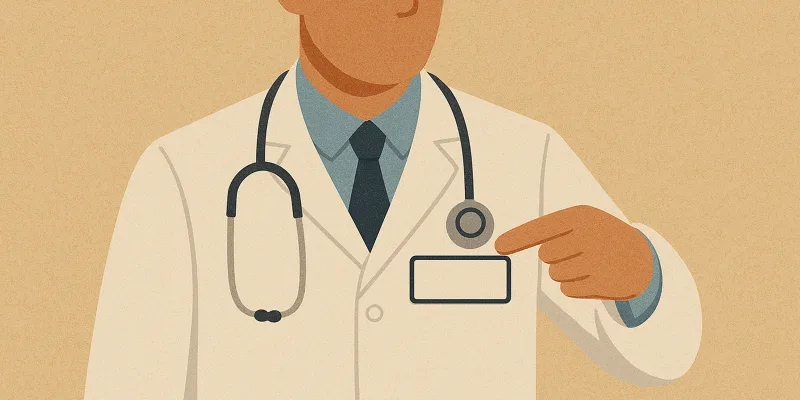As an early-stage career physician, I have gone on many job interviews in the last five years. Between applying to residency, then a one-year hospitalist job, a one-year fellowship, and most recently a post-fellowship position, my main takeaway is this: The medical profession has much to learn from other industries in effective interviewing.
Very few interview questions I received got to the core of trying to actually assess how good of a doctor I am. I was always asked: “Why did you become a doctor?” “What do you hope to gain from our program?” These are surface-level questions that can easily be crafted, memorized, and rehearsed. It especially surprised me how often different interviewers from the same institution asked me these same questions in back-to-back interviews.
Rarely did I come across behavioral type questions: “Tell me about a time you made a mistake.” “When did you have a conflict with a coworker and how did you handle it?” “What would you change about your current job?” While these questions were more thoughtful, they were often read by an interviewer writing down my answers as I talked, before robotically moving onto the next question. Rarely did someone follow-up with pertinent reflections and push the conversation deeper.
At the end of the day, no potential employer has ever evaluated me on the skills a doctor actually practices: problem solving through a clinical presentation, interpreting scientific studies, performing procedures, communicating with patients/families/team members, documentation, teaching, and managing. Instead, the focus has been on my resume, my personality, and my passion (and of course, the biggest bias of all: how good I happen to be at answering interview questions).
The standardization of medical schools and residency programs is in part so that they can claim they churn out doctors who are all capable of the same role. My coworkers often respond to my criticisms of these interviews by saying: “The expectation is that after so many years of medical school and residency, doctors have a baseline level of competency.” And yet, we know that in reality there are a variety of strengths and weaknesses a clinician may have, which may suit them well for some roles but not others. (Not to mention that some doctors are, on average, just plain better than others, especially when it comes to leadership.) Why is the expectation that we will have the same positions, the same pay, and that doctors rarely get fired for poor performance?
In no other field that I know of is there such little differentiation between strong and weak talent. My husband and I have been together since college and I have watched him go through consulting job interviews, then career coaching for business school students, and then become the director of a growing organization. Hiring is a rigorous process of completing job specific tasks, an intense evaluation of strengths and weaknesses, and detailed conversations over professional expectations and growth. While this undertaking is time and thought intensive, the result of more likely hiring the right fit makes it worth it.
To improve the hiring process within health care, I think there is some low-hanging fruit:
First, each physician hiring manager can figure out what they value: what type of mission/culture they are aiming to achieve, and what types of skills they want to foster.
Second, they can implement questions to better evaluate physicians for the skills they will be using day-to-day. For example, discuss complex clinical cases in detail: hear how an applicant would evaluate the patient, read how they would document the encounter, and reflect on potential challenges they may face. Doing a sample work project is frequently used in the business world and could be used as an effective tool in medical interviews.
Third, they should take references very seriously. I had one boss jokingly tell me, “I’m calling your references just to make sure you’re not a murderer.” Many potential bosses did not even ask for references. As I've learned from finding the best childcare for my children, this is one of the best ways of understanding a candidate’s personality, strengths, and weaknesses, and whether they have the potential skill match for the position you are hiring. Would this previous manager rehire the candidate? How did they compare to other employees? And why did they leave their previous role?
One of the most unexpected skills I learned during my medical training was the performance of doctoring. I could seem like I knew how to do a procedure even though I was completing it for the first time. I nodded along to medication names and medical acronyms during clinical rounds while secretly googling the descriptions later. This ability to perform served me well during the job interview process, but clearly patients do not want doctors who are performers — they want the real deal.
Throughout medical training, we are taught the cardinal rule that the patient history matters. The correct diagnosis is often from the details and the appropriate treatment takes into account the individual. We should advocate for this attention to detail when hiring providers and finding the right doctors for each role.
What's an interview question you wish you would have been asked? Share your ideal interview questions in the comments.
Charlotte Grinberg is a fellow in hospice and palliative medicine at Beth Israel Hospital in Boston, MA. Her writing has appeared in JAMA, Health Affairs, and the Annals of Internal Medicine. She tweets at @drcharlotteG. She was a 2020–2021 Doximity Op-Med Fellow and continues as a 2021-2022 Op-Med Fellow.
Image by Irina Strelnikova / Getty







